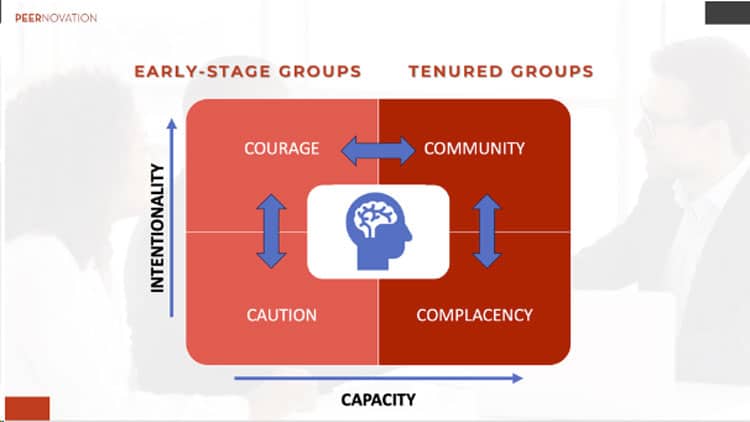Psychological Safety: It’s Hard Enough Without Yellow Flags

I recently submitted a piece to CEOWORLD Magazine about CEO Forums, which featured a 2×2 figure (see below) illustrating the stages of psychological safety the members experience as the group matures. These stages include Caution, Courage, Community, and Complacency. Caution and Courage are the stepping stones toward Community (where being vulnerable is less about courage and more about generosity). Yet, member turnover can cause a group to slip back to the Courage or Caution stages. More tenured/stable groups can achieve and sustain Community (with everyone playing all-in) until they find themselves becoming Complacent about their collective engagement. When that happens, the forum isn’t maximizing the rich environment the members created.

Even under the best circumstances, a CEO Forum’s psychological safety can be challenging to achieve and even more difficult to sustain. In the National Football League (NFL), referees throw a yellow flag when a team is caught flouting the rules. Common penalties include offsides, holding, and pass interference, to name a few. They can kill a team’s momentum and make the difficult task of scoring a touchdown that much more daunting. Here are a few CEO Forum penalties that can not only halt forward progress but also destroy a group’s chances for success.
Breaching Confidentiality
A fundamental tenet of CEO Forums is that confidentiality isn’t just an imperative, it’s the law. Many forums refer to it as the Vegas Rule – what happens during the meetings stays there. Members share profound personal and professional challenges and aspirations with one another, clearly believing they are safe to do so. While it’s rare that confidentiality breaches happen, if they do, it’s usually inadvertent rather than intentional.
Here’s one example of how it can happen by accident. Sheila arrives home at the end of the day, and her partner Tom asks, “How did your CEO meeting go?” To which she replies, “Great.” He then responds by saying, “Great? That’s it? You spent hours at your meeting today; tell me more.” Sheila reveals some of the day’s discussion topics (without thinking anything she shared would ever be repeated), including that her fellow member Mike plans to sell his company. Days later, Tom runs into Mike at the golf course and says, “Congratulations, I understand you’re selling your company.” Mike responds with a gasp. At the next forum meeting, Mike is furious that the news got out because he shared his intentions with the members in what is supposed to be a safe place. This revelation not only compromised Mike’s psychological safety (maybe irrevocably) but also sent a message to everyone in the group that the environment may not be safe for them either.
For someone who receives the “Tell me more” retort, I offer a small but essential gold nugget to live by – refrain from sharing other people’s stories. This nugget serves as an antidote for CEO members who want to live by their promise to the group, and it will protect you from revealing anything anyone else said during a meeting. If you’re going to talk with your partner about what challenge, opportunity, or decision you raised with your members, that’s up to you. Just don’t bring others into the conversation.
Responding Poorly
Let’s say your fellow member Derrick raises a specific challenge, admits he doesn’t know something, or cops to a mistake he made in leading his senior management team. During this exchange, you will be challenged to lean into your curiosity so that you’re not inclined to rush to judgment, jump to conclusions, or make assumptions that might prompt you to say something that would cause Derrick to feel even more vulnerable than he does already. Yet, out of nowhere, you make a flippant remark that rocks him back on his heels. While you may have made it in jest, it cut deeply in the moment – a fifteen-yard penalty if there ever was one. Note: Don’t do that.
To make matters worse, this occurrence was problematic for everyone. It left the other members thinking, “I don’t want to be THAT person next time.”
Other Acts Worthy of the Yellow Flag
Here are some additional penalties to consider:
- Criticism and Blame: Attacking or blaming individuals for mistakes can create fear of ridicule.
- Disregarding Opinions: Ignoring or dismissing someone’s contribution stifles openness.
- Interruptions: Frequent interruptions can imply that others’ input is not valued.
- Competitive Behavior: Trying to outdo each other fosters competition over collaboration.
- Non-verbal Cues: Eye-rolling, sighing, or other negative body language can discourage participation.
- Domineering Participation: A member who frequently dominates conversation can suppress others’ contributions.
- Failure to Address Issues: Not dealing with conflicts or problems can simmer underlying tensions (the opposite of what members should be able to achieve in this environment).
Summary
In my last article, I shared that realizing, maintaining, and maximizing psychological safety in a CEO Forum is a tall order even under the best circumstances. My message here is similar to what football coaches try to instill in their players, “Play all out but be disciplined. Moving the ball down the field is hard enough; let’s not make it even harder by committing penalties that will set us back.” Treat your psychologically safe environment with care, do your best to stay penalty-free, and reap your forum’s countless rewards.
Have you read?
Countries: Powerful Passports. Countries: Richest. Countries: Poorest. Countries: Happiest. Countries: Life Expectancy.
Bring the best of the CEOWORLD magazine's global journalism to audiences in the United States and around the world. - Add CEOWORLD magazine to your Google News feed.
Follow CEOWORLD magazine headlines on: Google News, LinkedIn, Twitter, and Facebook.
Copyright 2025 The CEOWORLD magazine. All rights reserved. This material (and any extract from it) must not be copied, redistributed or placed on any website, without CEOWORLD magazine' prior written consent. For media queries, please contact: info@ceoworld.biz








